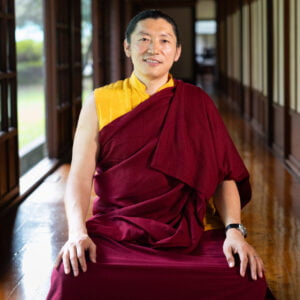Science of mind occupies a great deal of attention in Buddhist philosophy. This is not some new development; ancient Buddhist texts include major treatises investigating the mind. In this audio teaching, Khenpo Gyaltsen discusses how Buddhist thinkers approach the study of mind.
Here, the audio is available in English with translation into Brazilian Portuguese!
So, when we begin investigating the mind scientifically, we need to ask some fundamental questions. What is the mind? And how does mind arise–what causes it? How does our mind function? There are so many ways we could analyze–and the Buddhist texts contain many categories of mind.
But Khenpo Gyaltsen says that it is more important for us to understand some basic principles–like how to control our negative emotions by understanding a little bit about the mind. Knowing key points can allow us to live happier lives on a daily basis.
Science of Mind: Definition of Mind
We can begin with a definition of mind. “Mind is that which is clear and aware”.
Science of Mind: Experience Leads to Valid Cognition
Khenpo points out that the Buddha taught based upon his own experience–his philosophy developed from actual clinical experience based upon investigation and analysis–not just theory. We say that the Buddha taught based upon valid cognition, not simply supposition. When we compare “modern science” we can see how scientists regularly propose new theories of how things work and what causes other things. But as they test them the theories change over time. So we should really think carefully when we say , “Oh, Buddhism is similar to science.” Maybe we should see that it is the other way around!
Science of Mind: Consciousness Without Beginning
According to Buddhist explanation of mind, we cannot discover the beginning of mind. Yet we can observe conditioned behaviors, even in newborn babies–human as well as animal. For example, a new-born automatically wishes to drink mother’s milk. And, Buddhist scholars explain that these patterns show evidence of previous consciousness that store patterns somewhere.
Habitual tendencies remain as seeds in an all-ground consciousness that carries on as a continuity over multiple lifetimes. Seeds don’t just disappear, do they? Even if they seem to blow away, they end up falling onto some ground, and then giving rise to a new plant. In the same way, our habitual patterns don’t just vanish–they may lie dormant for awhile, but they’re ready to burst forth!
Positive Mind and Negative Mind
Generally, in Buddhist terminology we speak about 5 negative emotions:
- Ignorance
- Attachment
- Anger
- Jealousy
- Pride
Sometimes we condense the five into three: ignorance, attachment and anger. And these strong negative emotions bring about suffering, both in day-to-day life and in the future.
Science of Mind: Examining Anger as an Example
When we think about being angry–in the first moment we can’t really control it, right? But in the next few minutes, we can try to watch our own experience. What does anger feel like? Think about this–we can feel the heat and burning sensation, can’t we? When we are angry, do we feel happy? If we have high blood pressure we can really feel distress–it can even cause serious physical damage. And we like to appear beautiful or handsome, right? But, when we are angry, do we look attractive to others? Probably not! We look very ugly–and we really don’t want to look that way.
So, if we don’t want to suffer ourselves, or cause suffering to others, then we need to know how to control that anger. We all need to live together and get along. And most of us don’t want to live around people who are angry and short-tempered all the time, do we? Because we feel uncomfortable we will avoid that person, and we might feel embarrassed or ashamed to be around such people. But if we don’t break this habit, we will continue to suffer.
Similarly, we could examine all the negative emotions in the same way. For example, we could think about pride. We may think we are very special,–we become proud because of our beauty, our possessions, our position, and our status. But pride brings a great deal of suffering. People feel they deserve special treatment when they are proud; they insist on respect. But proud people don’t respect others well–because they’re thinking always, “I”, “I”, “I”. And pride and jealousy often work together to make us suffer. We’re constantly chasing validation and wanting respect from others.
Science of Mind: Eliminating Negative Emotions
So, we need an antidote to the suffering brought by anger, and pride, and all the negative emotions. First we can think about a permanent antidote, and then also temporary antidotes. Only one thing can thoroughly eliminate negative emotions–and that is the full realization of selflessness. Selflessness will cut all the negative emotions at their root. But as we work to realize selflessness, we can also apply temporary measures. In that way, we can gain control and reduce suffering.
Temporary Measures to Reduce Negative Emotions
In order to reduce negative emotions, we begin to understand how they arise. And when we investigate, we can see for ourselves that anger, for example, arises from focusing on someone or something else’s negative qualities. When we focus on something negative, we fan the flames of anger. Instead, if we shift our focus to the same person’s good qualities, we give ourselves some space. We allow for other options–and we can see things in a more calm way.
Conversely, if we are working with pride, we switch the antidote. If we are puffed up with pride, we usually overrate our positive qualities. And we don’t respect other people. So instead, we look at our own negative qualities or admit areas where we are not so perfect, so learned, so beautiful, etc. As we are not all buddhas yet, we know that we have some deficiencies, right? So, to reduce our pride, we can examine ourselves honestly. We may be surprised to discover that we don’t have so many special qualities to boast about.
Importance of Balance
When we hear advice like this, we might make the mistake of coming down hard on ourselves and then seeing only our negative qualities. Please understand this is not the point! Instead, we are aiming here for a sense of balance. If we suffer from arrogance or pride, we honestly see those as our faults and recognize where we need to improve. But, if we only look at our negative qualities, then we might fall into depression. This is not the aim!
When our four physical elements become unbalanced, we develop sickness. Similarly, we should aim for mental balance. If we are proud, we need to observe our faults, and if we are depressed, we should focus on our good qualities.
Train in Love and Compassion
Modern education solves many problems; through modern education, we have made great material progress in our world. But, for balance, we also need inner education, focused on developing positive qualities such as love and compassion. Very educated people have brought about many contributions, but they have also introduced new horrors such as the atomic bomb, or machine guns. We can recognize that development also can be negative due to a lack of love, compassion, and ethics. People chase name, fame, and money, without regard for the future. So, we also need to bring in inner education to balance society.
Many of us have seen that higher standards of living and modern development can bring new and different problems, right? Look at the rates of anxiety and stress we witness in modern society. But, if we balance modern education with inner training in love and compassion, we can create a better world. Love and compassion bring inner peace, and these qualities automatically attract others.
Balancing Compassion and Emptiness
We also learn to balance the practice of compassion–bodhicitta with emptiness. If we only focus on compassion, we might become too sad or depressed–there is a risk. But, if we learn to integrate meditations on emptiness, on the unreality of These two practices work together to keep us on the right track.
Essential Point for Beginners
When we first start, our mind constantly buzzes like a bee moving around a flower. Why is this the case? Because we have developed habits over such a long time, we cannot control our minds. But, we can train and gradually gain control over our minds. We all begin like busy bees, buzzing from here to there. Yet, if we simply keep sitting to meditate, gradually that bee calms down. Often we refer to the untrained mind as “crazy mind” or “monkey mind”, and we all experience this. Our mind flits from thought to thought.
When we try to control our minds, we use two tools: mindfulness and watchfulness. Right now, we lack strength in these practices. The essence of meditation is mindfulness. We can sit up properly in meditation posture, but if we’re not aware and watching our minds, we aren’t really training.
Reflection Exercise
Over the next several weeks, take some time to sit for even a few minutes each day, observing your mind. Can you notice how the mind buzzes around like a bee? If so, that is a great first step–that means you’re doing something unusual–you are noticing your own distraction. So, when that happens, please see this as a good thing. You’re tuning into your habitual busy and active mind.
Then, when it flits off again, simply notice that, and gently come back to either your breath or to an object -–placing your focus very lightly there. Then, with kindness and gentleness, continue to watch what occurs. If you do this exercise regularly, you might witness a reduction in buzzing–and even a few seconds of rest! Don’t force anything–just notice what occurs with curious attention. What happens?













Responses